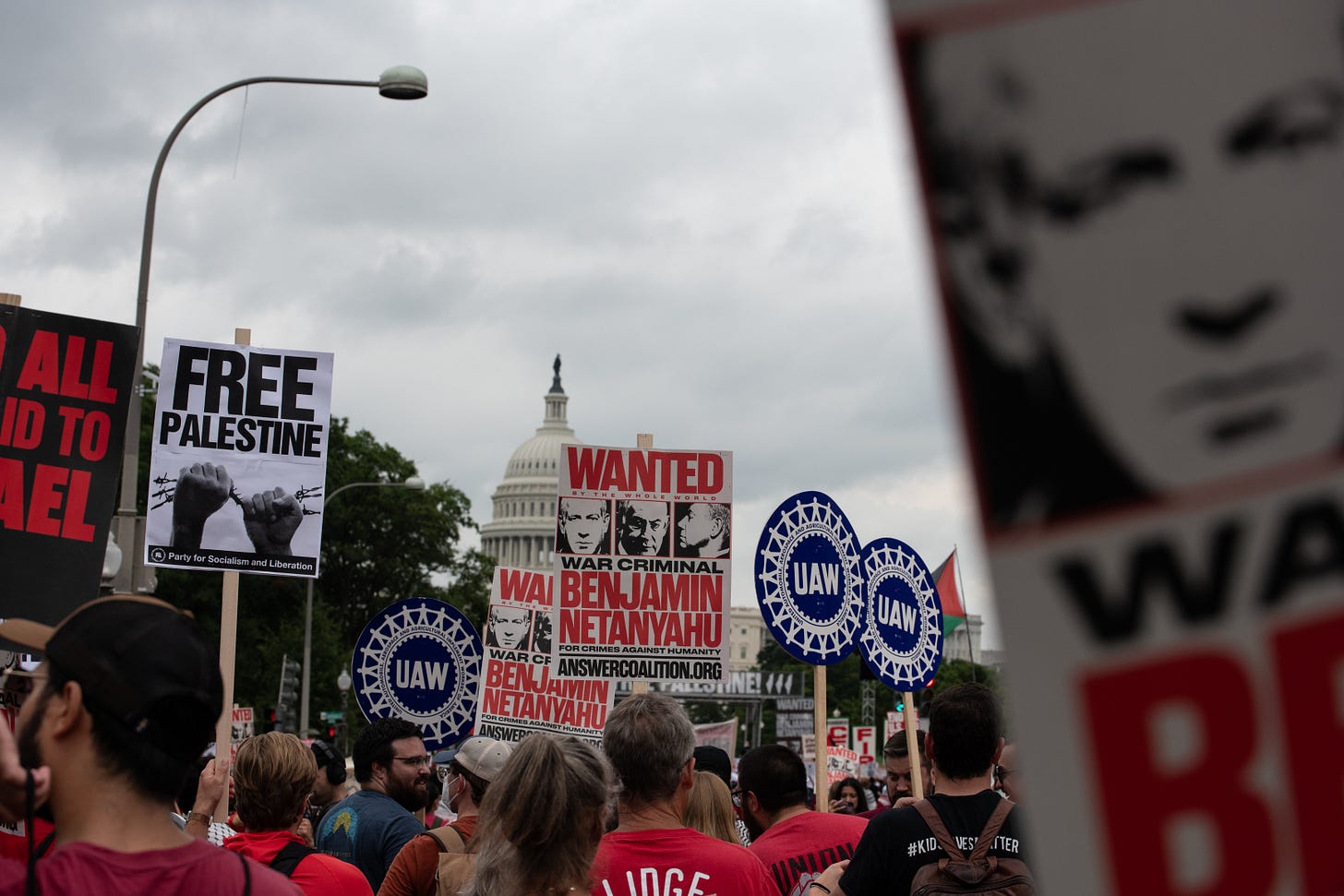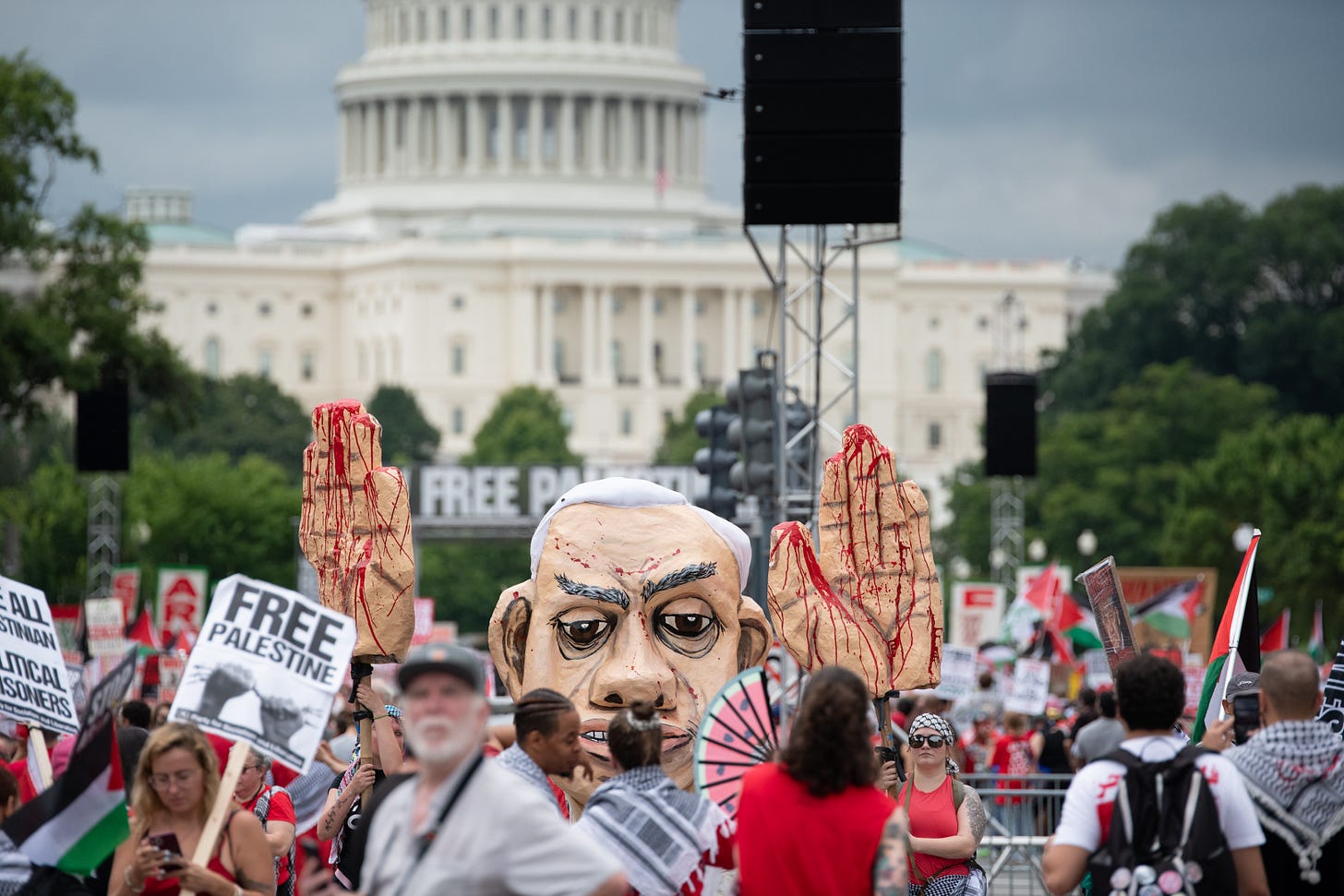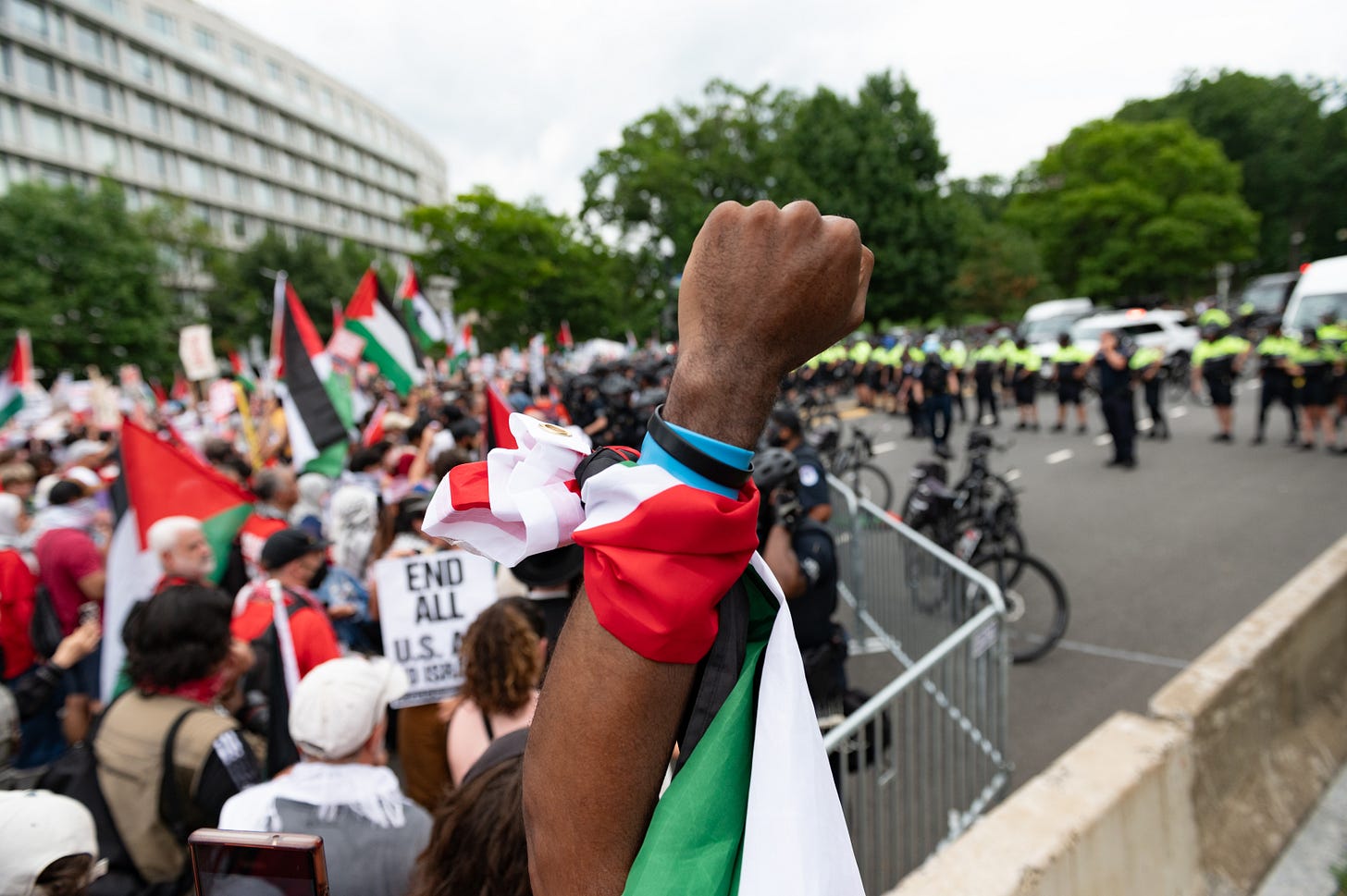To Stop the War in Gaza, Unions Are Showing Us What Solidarity Looks Like
As Netanyahu asked Congress for more aid, thousands of protesters, including union workers, pushed for it to end.
Originally for The Progressive
Israeli Prime Minister Benjamin Netanyahu visited the United States this week to give a speech to a joint session of Congress and visit former President Donald Trump at his home in Florida. Over the past ten months, Netanyahu has led a campaign that many have called a genocide against Palestinians in Gaza. In front of Congress, he called for the United States to “Give us the tools faster, and we’ll finish the job faster.”
About forty Democratic members of Congress refused to attend the speech. Vice President Kamala Harris was notably absent, attending a prior engagement instead (although she did meet separately with Netanyahu the following day and affirmed her “unwavering commitment” to Israel). Republican Vice Presidential Candidate and Ohio Senator J.D. Vance also skipped the speech because of his “duties to fulfill as the Republican nominee for Vice President,” according to a senior adviser to the Trump campaign.
Representative Rashida Tlaib, Democrat of Michigan, attended but, instead of applauding, held up a small sign that said “Guilty of Genocide” on one side and “War Criminal” on the other. Outside of the Capitol Building, thousands of protestors rallied on Pennsylvania Avenue bearing the same message. “There is no possibility of looking at this a different way than as a terrible genocide and war crime,” leftwing journalist Eugene Puryear said from a stage addressing the demonstrators. “Tens of thousands of people have been killed because of Netanyahu.”
Large protests against the ongoing genocide in Gaza have become a frequent occurrence in the nation’s capital. Last month, the “Red Line” protests around the White House called for President Joe Biden to cut funding for Israel’s war in Gaza and push for a ceasefire. This time, activists were joined in solidarity by labor unions.
The solidarity movement between American labor and international activists is nothing new. The American Federation of Labor (AFL) boycotted Nazi goods in 1933 and the 1936 Olympics in Berlin. In 1984, the International Longshore and Warehouse Union (ILWU) Local 10 stood up against apartheid in South Africa and refused to unload South African goods for eleven days. In 2023, as the mass killing of Palestinians in Gaza began in earnest, the former head of ILWU Local 10, Larry Wright, said, “It’s really important that the unions come out and oppose this terrible violence on the Palestinians.”
On Wednesday, members of the United Auto Workers, the American Postal Workers Union, the National Education Association, and the Alphabet Workers Union took to the streets of Washington, joining protesters decrying Netanyahu’s genocide in Gaza.
APWU President Mark Diamondstein speaks at the protest against Netanyahu's visit.
Mark Diamondstein of the American Postal Workers Union (APWU) took to the stage and called out Biden and the U.S. Government for their part in Israel’s bombardment of Gaza, proclaiming that, “As the main financial backer of the Israeli military machine, the White House has the leverage to stop the massacre.”
Diamondstein also denounced the government’s perpetuation of “a falsehood that criticizing the government of Israel and our own somehow equates to being antisemitic or anti-Jewish.” The APWU has a legacy of standing up against injustice on an international level: Members of the union participated in South Africa’s first election post-apartheid along with the AFL-CIO.
United Auto Workers (UAW) member Brandon Mancilla underscored that the connection between American union workers and victims in Gaza wasn’t abstract, reminding the crowd that many of his union co-workers in Michigan have family there. With Michigan being a key battleground state, these workers’ votes carry weight. But it’s not entirely clear that Democratic strategists understand that the war on Gaza is more than just an issue argued about on Twitter for these voters.
UAW member Brandon Mancilla speaks to The Progressive at the protest against Netanyahu's visit.
Mancilla clarified why the UAW in particular would care about this international issue: “Our union has a long history of being very vocal against human rights abuses and wars and foreign conflicts. And the reason why is because we are directly implicated. And then our taxpayer money pays for political backing and weapons and military sources that a lot of states that infringe upon human rights commit.”
Arrion Brown, a member of the APWU, a union that has seen some struggles over the past ten years with dramatic cutbacks and controversial choices at the top by Trump appointee Louis DeJoy, understands the importance of power in numbers: “We are ultimately the power—that’s our position, how we feel. And collectively, if we organize together against the issue like this, we can change the direction.”
AWU President Parul Koul speaks to The Progressive at the protest against Netanyahu's visit.
Similarly, Parul Koul, the president of the Alphabet Workers Union, observed that, after months of watching videos and seeing photos of IDF killings in Gaza, Americans seem to be slowly re-learning the importance of international solidarity. “In the United States, we’re often fed this narrative that what’s happening abroad isn’t really related to us,” Koul, who helped organize tech workers at Google, tells The Progressive. “But over the last nine months, people have just had so much education about how the United States’ political machinery is funding the genocide and in doing that, neglecting people’s needs here at home.”
None of the union members that The Progressive spoke with expected much of a policy change in a potential Harris Administration, but they were hopeful. At the time of writing, 39,175 Palestinians in Gaza, including more than 15,000 children, have been killed by Israel’s war.









